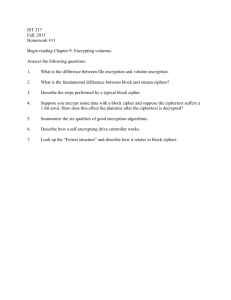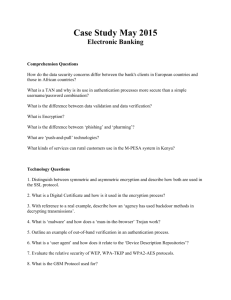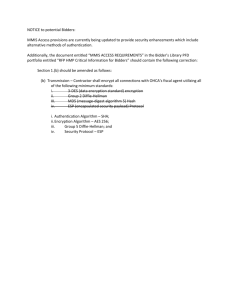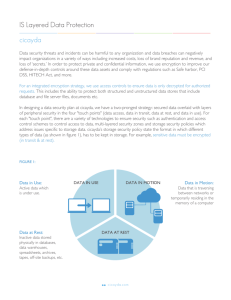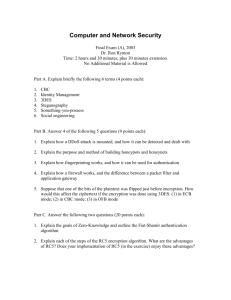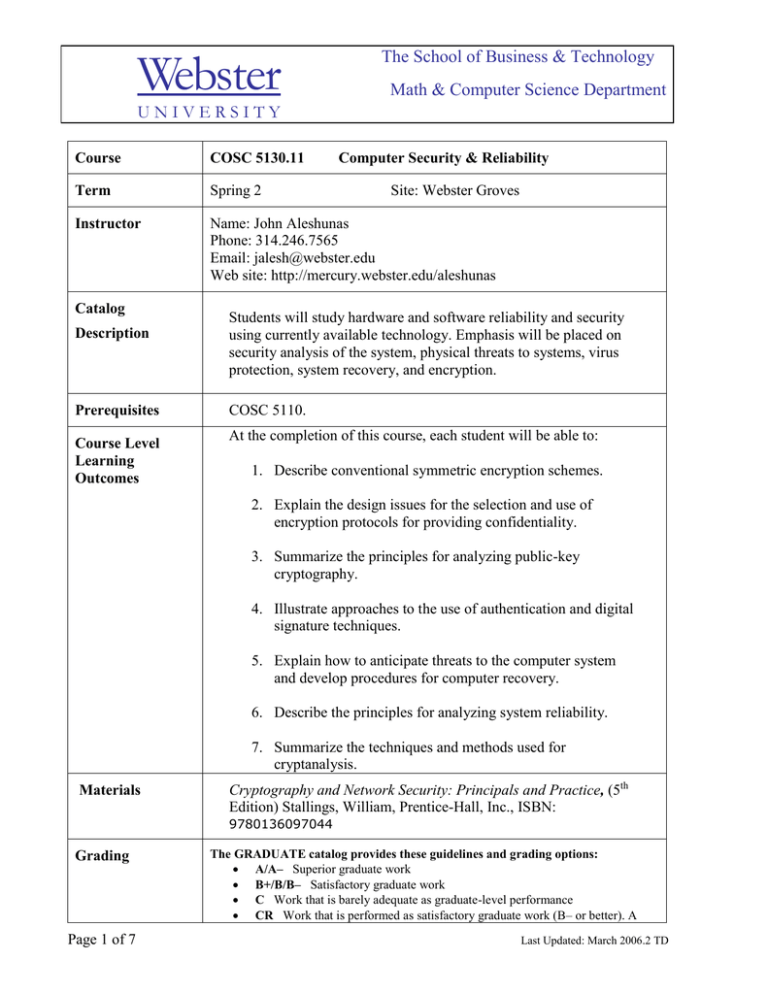
Webster
The School of Business & Technology
Math & Computer Science Department
UNIVERSITY
Course
COSC 5130.11
Term
Spring 2
Instructor
Name: John Aleshunas
Phone: 314.246.7565
Email: jalesh@webster.edu
Web site: http://mercury.webster.edu/aleshunas
Catalog
Description
Prerequisites
Course Level
Learning
Outcomes
Computer Security & Reliability
Site: Webster Groves
Students will study hardware and software reliability and security
using currently available technology. Emphasis will be placed on
security analysis of the system, physical threats to systems, virus
protection, system recovery, and encryption.
COSC 5110.
At the completion of this course, each student will be able to:
1. Describe conventional symmetric encryption schemes.
2. Explain the design issues for the selection and use of
encryption protocols for providing confidentiality.
3. Summarize the principles for analyzing public-key
cryptography.
4. Illustrate approaches to the use of authentication and digital
signature techniques.
5. Explain how to anticipate threats to the computer system
and develop procedures for computer recovery.
6. Describe the principles for analyzing system reliability.
7. Summarize the techniques and methods used for
cryptanalysis.
Materials
Cryptography and Network Security: Principals and Practice, (5th
Edition) Stallings, William, Prentice-Hall, Inc., ISBN:
9780136097044
Grading
Page 1 of 7
The GRADUATE catalog provides these guidelines and grading options:
A/A– Superior graduate work
B+/B/B– Satisfactory graduate work
C Work that is barely adequate as graduate-level performance
CR Work that is performed as satisfactory graduate work (B– or better). A
Last Updated: March 2006.2 TD
grade of "CR”is reserved for courses designated by a department, involving
internships, a thesis, practicums, or specified courses.
F Work that is unsatisfactory
I Incomplete work
ZF An incomplete which was not completed within one year of the end of the
course. ZF is treated the same as an F or NC for all cases involving G.P.A.,
academic warning, probation, and dismissal.
IP In progress
NR Not reported
W Withdrawn from the course
Your grade will be compiled from each of the class evaluation
components in the following proportions:
Mid-term Exam
Final Exam
Homework
Research Project
Total
Activities
25%
25%
10%
40%
100%
In this course, you will actively participate in the study of network
and system security design principles. As graduate students, your
emphasis should be on discovery and implementation and not on
simple memorization of facts. You will be expected to read the
assigned chapters and to actively participate in the class
discussions. Those discussions, as well as the individual projects,
will provide you a practical means to clearly comprehend network
and system security.
The homework assignments will be worth very few grade points
(this implies low risk). Their main purpose is to help me assess your
understanding of the course material and the presentation pace.
They also provide you the side benefit of pointing out what the key
concepts of the material are.
We will have two exams; a mid-term in week 4 and a final in week
9. The mid-term exam will cover all of the material from the first
three weeks. Because this course develops the subject material from
what’s presented earlier in the course, the final exam will be a
comprehensive test of all the material from weeks 1 through 7.
Individual Research Projects
The individual research project provides you the opportunity to
experiment with a selected security topic. You may select any
research topic, subject to my approval. Remember, we are trying to
gain competency in encryption and systems security and some
areas, for example where the problem domain is not constrained
Page 2 of 7
Last Updated: March 2006.2 TD
and well understood, may not be as productive as others.
Additionally, I want to expose you to a variety of security topics.
You can choose to conduct research and publish your findings in a
research paper (approximately ten double-spaced pages) or develop
a working experiment with a security technique or algorithm and
publish your findings in a report (approximately five double-spaced
pages). You will conclude your project with a presentation in week
8. Use the APA (American Psychological Association) style to
format your paper and its reference citations.
This is a formal paper, and it requires a formal presentation. This is
an opportunity for you to share your work with the class. Plan to
take ten-minutes to present your work, before questions and
comments. Don’t read your paper. Determine the most important
and interesting parts of your paper for the presentation (three items
at most). It is not necessary to include everything in the paper in
your presentation, and in fact, there will not be time to do so. You
must use PowerPoint as a presentation aid in you presentation. If
you choose to do a research project, present a demonstration of
your work.
Policy Statements:
University Policies
University policies are provided in the current course catalog and course
schedules. They are also available on the university website. This class is
governed by the university’s published policies. The following policies
are of particular interest:
Academic Honesty
The university is committed to high standards of academic honesty.
Students will be held responsible for violations of these standards.
Please refer to the university’s academic honesty policies for a
definition of academic dishonesty and potential disciplinary actions
associated with it.
Drops and Withdrawals
Please be aware that, should you choose to drop or withdraw from this
course, the date on which you notify the university of your decision
will determine the amount of tuition refund you receive. Please refer
to the university policies on drops and withdrawals (published
elsewhere) to find out what the deadlines are for dropping a course
with a full refund and for withdrawing from a course with a partial
refund.
Special Services
If you have registered as a student with a documented disability
Page 3 of 7
Last Updated: March 2006.2 TD
and are entitled to classroom or testing accommodations, please
inform the instructor at the beginning of the course of the
accommodations you will require in this class so that these can be
provided.
Disturbances
Since every student is entitled to full participation in class without
interruption, disruption of class by inconsiderate behavior is not
acceptable. Students are expected to treat the instructor and other
students with dignity and respect, especially in cases where a
diversity of opinion arises. Students who engage in disruptive
behavior are subject to disciplinary action, including removal from
the course.
Student Assignments Retained
From time to time, student assignments or projects will be retained
by The Department for the purpose of academic assessment. In
every case, should the assignment or project be shared outside the
academic Department, the student's name and all identifying
information about that student will be redacted from the assignment
or project.
Contact Hours for this Course
It is essential that all classes meet for the full instructional time as
scheduled. A class cannot be shortened in length. If a class
session is cancelled for any reason, it must be rescheduled.
Course Policies
Attendance and participation are required. Students with 2 absences
are advised to withdraw from the course. Please notify the
instructor as soon as possible regarding absences.
It is the student’s responsibility to obtain materials for class time
missed. It is a good idea to obtain notes from other students for
class time missed.
The last day to drop the course with a full refund is Friday of Week
2. The last day to withdraw from the course, without a refund, is
Friday of Week 6.
All work is due at the beginning of class and becomes the property
of the department. Any work turned after that will be considered
late and the grade will be reduced by 10 percent per day late.
Any student caught cheating or committing plagiarism might fail
Page 4 of 7
Last Updated: March 2006.2 TD
the class and be subject to further disciplinary action.
This syllabus may be revised at the discretion of the instructor
without the prior notification or consent of the student.
Weekly Schedule
Week 1:
Course overview
Introduction to computer security and attacks
Conventional encryption
Classical techniques:
Steganography
Monoalphabetic Ciphers
Polyalphabetic Ciphers
Transposition Techniques
Rotor Machines
Modern techniques:
Simplified DES
Block Cipher Principles
Differential and Linear Cryptanalysis
The Data Encryption Standard
The Strength of DES
Discussion of individual research papers
Week 2:
The Mathematics of Finite Fields
Modular and Polynomial Arithmetic
The Advanced Encryption Standard (AES)
Triple DES
International Data Encryption Algorithm
Example Algorithms
Characteristics of Advanced Symmetric Block
Ciphers
Traffic Confidentiality
Key Distribution
Random Number Generation
Week 3:
Prime and Relatively Prime Numbers
Testing for Primality
Discrete Logarithms
Principles of Public-Key Cryptosystems
The RSA Algorithm
Page 5 of 7
Last Updated: March 2006.2 TD
Diffie-Hellman Key Exchange
Week 4:
Exam
Week 5:
Authentication Requirements
Authentication Functions
Hash Functions
MD5 Message Digest Algorithm
Secure Hash Algorithm (SHA-1)
Digital Signatures
Authentication Protocols
Digital Signature Standard
Week 6:
Kerberos
X.509 Authentication Service
Pretty Good Privacy
S/MIME
IP Security Architecture
Authentication Header
Combining Security Associations
Week 7:
Web Security Considerations
Secure Sockets Layer and Transport Layer Security
Secure Electronic Transactions
Intruders and Intrusion Detection
Viruses, and Related Threats
Firewall Design Principles
Trusted Systems
Week 8:
Presentation of individual papers
Week 9:
Exam
Additional
Information
Copyright © 2005 – 2006, School of Business & Technology, Webster University. All rights reserved.
Page 6 of 7
Last Updated: March 2006.2 TD
Page 7 of 7
Last Updated: March 2006.2 TD

